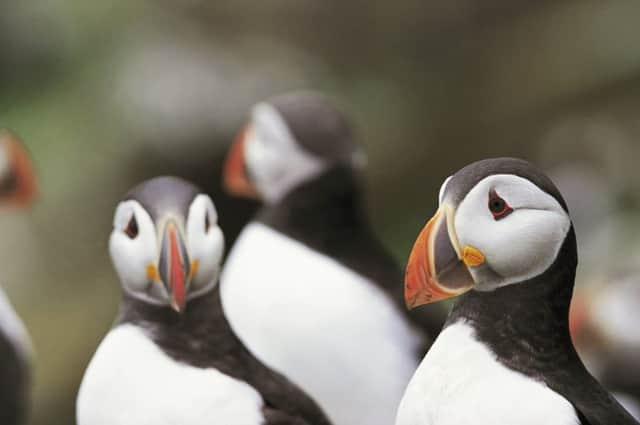New drive to save Scottish puffins from extinction


Puffins at two Scottish sites will be fitted with satellite tags in an effort to discover more about what they eat, where they go and what they feed their chicks.
Europe hosts more than 90 per cent of puffins worldwide with an estimated 10 million individuals.
Advertisement
Hide AdAdvertisement
Hide AdScotland is internationally important for the species, with more than 80 per cent of the total UK and Irish population.
Key Scottish nesting sites are on the Isle of May, in the Firth of Forth, and the Shetland and Orkney islands.
But numbers have shown rapid decline in recent years, thought to be driven by a combination of factors - including climate change, predation by invasive species, pollution, food shortages and entanglement in fishing nets.
The species has been declared vulnerable to global extinction,
Experts have predicted up to fourth fifths of the birds could be lost in the next 50 years if the trend continues.
Now conservation charity RSPB Scotland has been awarded nearly £50,000 from the Heritage Lottery Fund (HLF) for a new study that will include satellite tagging and extensive surveys.
Counts will take place at a number of colonies, many of which have been shrinking at an alarming rate, and GPS trackers will be fitted to 31 puffins at two Scottish sites to record information on feeding habits, locations and conditions.
Members of the public are also being invited to help out as ‘citizen scientists’ by sending in photographs of puffins feeding.
Advertisement
Hide AdAdvertisement
Hide AdIt’s hoped the work will help guide efforts to save the species from extinction.
“Puffins are wonderful birds that are in desperate need of help to ensure the long term survival of the species here,” said Ellie Owen, who heads up the RSPB’s seabird tracking work in the UK.
“Across the country there is great affection for these birds and this project will give people the chance to get involved with the work being done to save them.”
She added: “In the future we expect the project data will advise government on the best ways to protect puffins at sea.
“It’s devastating to think that our coastlines may no longer be brightened up by these birds coming into land furiously flapping their wings with their orange legs outstretched.
“RSPB Scotland is doing all it can to conserve this species and this project is crucial to our ongoing effort to turn puffin fortunes around.”
Lucy Casot, head of HLF Scotland, said: “Our natural heritage is a most precious resource and, thanks to National Lottery players, HLF grants have helped to protect an amazing range of landscapes, habitats, and species of plants and animals.
“HLF is delighted to support Project Puffin that will stimulate people’s interest in the natural world and so help them conserve it for future generations.”
Advertisement
Hide AdAdvertisement
Hide AdPuffins are often dubbed parrots of the sea because of their large brightly coloured beaks and distinctive markings.
They prefer to live on islands, where they mostly nest in burrows but sometimes under rocks and scree or in cracks on cliffs.
They lay a single egg and their young are called pufflings. After hatching, a young puffin remains concealed in the nest until the night comes to head for the open sea.
It will not return to the nest site until it is ready to breed, usually around five years later.